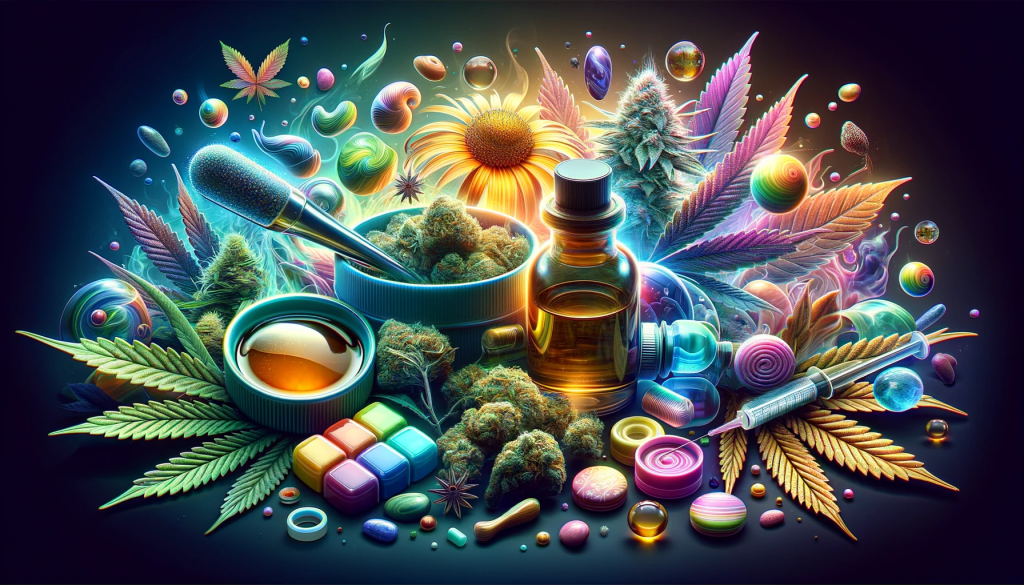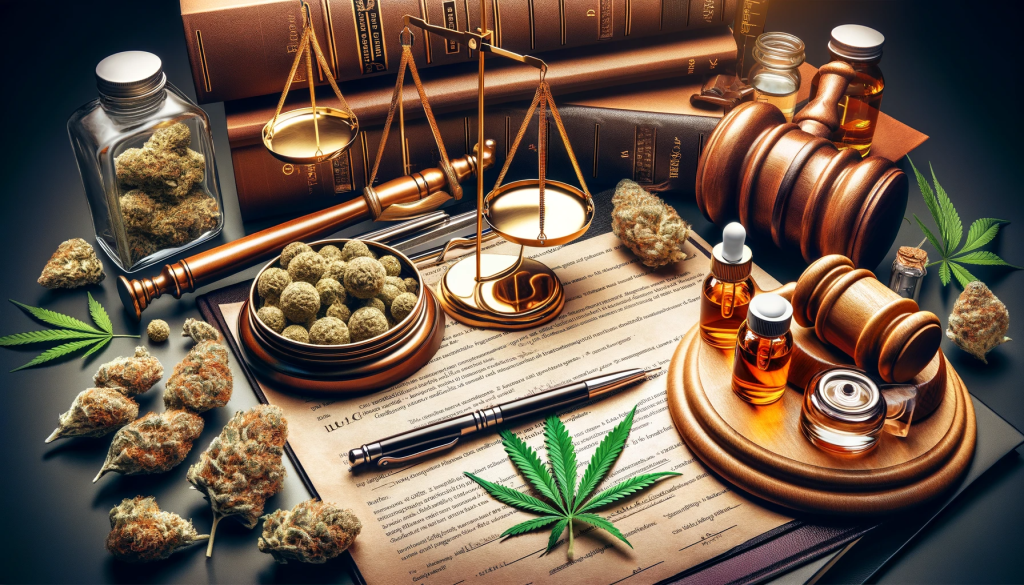Radical advances in the cannabis industry have increased the range of products available for many users, from THC enthusiasts to chronically ill people seeking relief or just casual users checking out the hype. Delta-8 and delta-10 are two unique minor cannabinoids derived from hundreds found in cannabis plants, hemp plants, or Cannabis Sativa, best known as the medical marijuana plant.
Today, we’re exploring delta-8 and delta-10. We’re evaluating their effects, potential benefits and adverse effects, psychoactive properties, and possible side effects. We also take a look at the legality of delta-8 TCH and delta-10 THC and each’s status concerning controlled substances and the law. We aim to make it easy to decide which one is right for you.
Are you ready to learn about the difference between delta-8 THC and delta-10 THC cannabis products? Then, let’s get started!
Understanding Cannabinoids

Cannabinoids are compounds found in cannabis plants, like hemp plants. They produce a wide range of effects due to their molecular structure and how they interact with the body’s cannabinoid receptors.
What are cannabinoids?
Cannabinoids are chemical compounds derived from the cannabis plant that interact with the human body’s endocannabinoid system. The most studied cannabinoid is delta-9 Tetrahydrocannabinol (THC).
THC is responsible for the psychoactive properties of marijuana. However, there are other cannabinoids present in smaller concentrations of THC, such as delta-8 THC and delta-10, which interact differently with the human body and have their own potential therapeutic value.
Both derivatives of THC differ in their molecular structure and have unique properties. Delta-8 has a double bond at the 8th carbon position. Delta-10 has a double bond at its 10th carbon position. The differences between delta-8 and delta-10 aren’t limited to differences in their chemical structure. Whether a user can pass a drug test may depend on whether they consume delta-8 THC or other types of cannabinoids.
How do delta-8 and delta-10 differ?
Delta-8 and delta-10 THC are two different forms of cannabinoids found in the cannabis plant. Although they have similar molecular structures and effects, delta-8 differs from its more popular counterpart, delta-9 (also known as THC), due to the position of the double bond on its chain of atoms.
In delta-8, the double bond is located on the 8th carbon atom. In delta-9, the double bond is on the 9th carbon atom. This slightly different placement means delta-8 THC interacts more strongly with CB1 receptors than CB2 receptors. The reverse is true for delta-10. It has a stronger affinity with CB2 receptors than CB1 receptors.
Delta-8 THC and delta-10 THC elicit distinctive reactions within the body. Consumers often note that delta-10 induces greater mental effects compared to other THC molecules, whereas delta-8 can produce a more intense “body vibe” when ingested or inhaled.
Effects and Uses of Delta-8 and Delta-10

Delta-8 and delta-10 THC interact with the body in different ways, offering both potential medical benefits and opportunities for recreational use. However, be careful with your ingestion of any type of THC. If you work or go to school somewhere that drug tests, even a small amount of delta-10 or delta-8 THC could result in a positive drug test.
How delta-8 THC and delta-10 THC interact with the body
Delta-8 THC and delta-10 THC are compounds found in cannabis plants. Both are psychoactive. They interact with the body’s cannabinoid receptors to produce their effects on the user. Delta-9 THC is the most commonly known form of THC. It binds to cannabinoid receptor type 1 (CB1) to produce its psychoactive effects.
Similarly, delta-8 THC and delta-10 THC bind to CB1 receptors as well. But, their binding isn’t as tightly connected as delta-9. Research suggests that delta-8 THC and delta-10 THC bonds may even be weaker than delta-9 when it comes to potency.
While all forms of delta THC are similar in certain interactions with CB receptors, they each differ slightly in terms of how they bond or break down after entering the body.
Potential medical benefits
Delta-8 THC and delta-10 THC have potential therapeutic properties, as demonstrated by limited medical research. These cannabinoids may interact with the body to potentially provide anti-inflammatory effects, help pain management, reduce stress levels, and promote relaxation. However further studies are needed to fully understand its benefits and effects on the human body. Some areas where more research is needed include understanding the mechanisms of delta-8 THC and delta-10 THC and their respective medical uses, health benefits, and risks involved while using them.
Risks and Side Effects of Delta-8 THC and Delta-10 THC

Consuming delta-8 THC and delta-10 THC may have certain risks, such as undesirable psychoactive effects or potential legal consequences, like failing a drug test. So, research should be conducted before trying delta-8THC or delta-10 THC.
Potential risks of consuming delta-8 THC and delta-10 THC:
- Cognitive difficulties and altered perception: Delta-8 and delta-10 may impact cognitive function, causing difficulty concentrating and impairing short-term memory. They can also alter a person’s sense of time and mood.
- Anxiety and paranoia: Consumption of delta-8 THC or delta-10 THC variants may produce anxiety or paranoia in some people, which could be quite dangerous depending on their situation.
- Inhaling or consuming chemicals: Inhaling or consuming chemicals like delta-8 THC or delta-10 THC may result in negative health impacts over time. Use caution with these hemp plant products.
- Unknown safety risks: Neither variant’s safety has been thoroughly established since both are relatively new substances. Unknown side effects could result from prolonged use of either delta-8 THC or delta-10 THC. Researchers initially studying the effects of delta-8 THC and delta10 THC had limited data collection periods.
- Unapproved use of products and lack of FDA evaluation: Further research should be conducted into the long-term effects of delta-8 THC and delta10- THC. Proper evaluation from governing bodies such as the FDA is also necessary to affirm or address adverse issues related to mental capacity, such as anterograde amnesia etc. Use caution when experimenting with delta variants until more information becomes available regarding true claims relating to its dangers.
Common side effects
Consuming delta-8 THC or delta-10 THC products may lead to a range of adverse reactions, including nausea, shaking, nervousness, lightheadedness, disorientation, fainting, or altered perception. In some cases, users also reported mental fog and upset stomachs due to the ingestion of these cannabinoids. Hallucinations, vomiting, tremors, anxiety, dizziness, confusion, and loss of consciousness are also common side effects that have been linked with the use of delta-8 THC or delta-10 THC products.
The Legality of Delta-8 THC and Delta-10 THC

Delta-8 THC and delta-10 THC currently have different levels of legal status, depending on the state or country in which they are consumed or sold.
Current legal status
The legal status of delta-8 THC and delta-10 THC is uncertain and can vary from state to state. The U.S. Food and Drug Administration (FDA) has not evaluated or approved either product, so there are restrictions on its consumption or distribution depending on the regulatory environment of certain states.
In certain states like Arizona, California, Minnesota, and Mississippi, where cannabis laws are more stringent than in other parts of the country, delta-8 THC and delta-10 THC may be regulated under federal law.
In general, both products are federally legal throughout most of the United States as long as their delta-9 THC content remains under 0.3 percent dry weight concentration. However, some individual states maintain a different standard, such as Idaho’s maximum allowed limit of 0.0%.
Differences in legality among states
The legality of delta-8 THC and delta-10 THC varies greatly across the United States. Some states permit the sale and use of these products, while others have imposed strict regulations or outright bans.
Before purchasing or using delta-8 or delta-10 THC, consumers should check the specific laws and regulations in their state.
Where to Find delta-8 and delta-10 Products
With the rise of the cannabis industry, consumers have access to a wide range of delta-8 and delta-10 products from several selected trusted brands.
Types of products available
Delta-8 and delta-10 THC come in a variety of product forms: edibles, chocolates, baked goods, vape pens, extracts, and tinctures. Edible options include gummies and chocolate bars infused with delta-8 or delta-10 THC. A user could “vape” delta-8 THC or delta-10 THC. Users have multiple options for THC vapes, as the cannabinoid liquid comes in many varieties.
Delta-8 or delta-10 extracts may consist of oils used as droplets, which can be consumed immediately or administered on food. Tinctures offer an option for direct ingestion under the tongue or may be added to drinks like coffee or tea. Multiple consumption options provide consumers with personalized methods of enjoying delta 8 and 10 effects.
Other Forms of THC to Explore
Conclusion
Delta-8 and delta-10 may both provide unique effects depending on the individual. Your side effects should be considered. Users should also consider the legal implications of consuming delts-8 THS or delta-10 THC. Possible drug tests are also something to note.
FAQs
1. What is the difference between delta-8 and delta-10?
Delta-8 and delta-10 are both forms of tetrahydrocannabinol (THC). Their chemical structure differs slightly, which causes them to have different psychotropic effects on the body.
2. Delta-8 or delta-10. Which has the most psychoactive effects?
Delta-10 has greater psychoactive effects than delta-8, but it is still considered mild in comparison to other THCs, such as delta-9 THC (the common THC variant of medical marijuana).
3. How do products with delta-8 or delta-10 affect my health?
Both compounds may have side effects such as anxiety, paranoia, disorientation, and heightened sensitivity to sensory input. These effects could be cumulative or exacerbated when delta-8 or delta-10 are used excessively or carelessly by individuals who may not be familiar with its effects or proper dosage. If you’re unfamiliar with delta-8 or delta-10, talk to your doctor before beginning use.
4. Are there any legal implications of consuming products containing either delta-8 or delta-10 form of THC?
Yes, many countries have restrictions on the possession and consumption of substances that contain forms of Tetrahydrocannabinol (THC). Be sure to check local laws before attempting to purchase/consume any product containing either delta-8 or delta-10 THC.
Can I take CBD and other medications from a doctor’s prescription?
No, suppose you are currently taking medications prescribed by your doctor and wish to add CBD products to your routine. In that case, it’s important to first speak with your physician about potential interactions when combining these two medicines due to safety concerns (potentially increased risk of adverse reactions).






